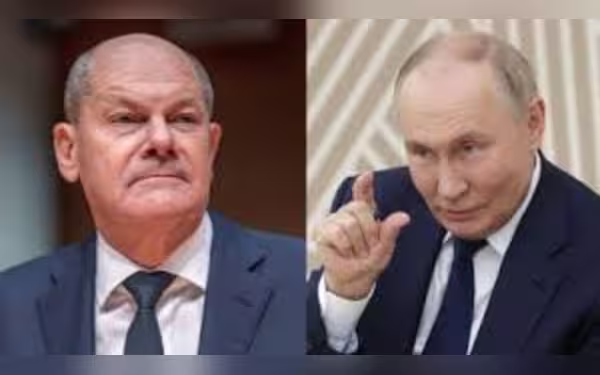Saturday, November 16, 2024 05:52 PM
Scholz and Putin Engage in First Direct Conversation in Two Years
- Scholz condemns Russia's aggression in Ukraine.
- Call emphasizes need for dialogue and peace.
- Germany reaffirms support for Ukraine's sovereignty.
 Image Credits: thefrontierpost
Image Credits: thefrontierpostGerman Chancellor Scholz speaks with Putin for the first time in two years, urging dialogue and support for Ukraine amid ongoing conflict.
In a significant diplomatic development, German Chancellor Olaf Scholz engaged in a phone conversation with Russian President Vladimir Putin on Friday, marking the first direct communication between the two leaders in two years. This call comes amidst the ongoing conflict in Ukraine, which has seen escalating tensions and widespread humanitarian crises since Russia's invasion in February 2022.
During the call, Chancellor Scholz did not hold back in expressing his condemnation of what he termed “Russia’s war of aggression” against Ukraine. He firmly urged President Putin to take immediate action by withdrawing Russian troops from Ukrainian territory. Scholz emphasized the importance of dialogue, calling on Russia to demonstrate a willingness to negotiate with Ukraine to achieve a just and lasting peace.
In a statement released by government spokesman Steffen Hebestreit, it was highlighted that Scholz reiterated Germany’s steadfast commitment to supporting Ukraine in its ongoing struggle. This support is crucial, as Ukraine continues to face significant challenges in defending its sovereignty and territorial integrity.
Prior to his conversation with Putin, Scholz had also spoken with Ukrainian President Volodymyr Zelenskyy, indicating a coordinated approach to the crisis. The German government did not disclose the exact duration of the call with Putin, but reports from the German news agency DPA suggest that it lasted approximately one hour.
This recent dialogue between Germany and Russia raises questions about the potential for future negotiations and the possibility of de-escalation in the region. As the conflict continues to impact millions, the international community watches closely, hoping for a resolution that prioritizes peace and stability.
While the conversation between Scholz and Putin is a step towards dialogue, the path to peace remains fraught with challenges. It is essential for all parties involved to engage in constructive discussions and work towards a solution that respects Ukraine's sovereignty and addresses the humanitarian needs of those affected by the conflict. The world is eager to see if this renewed communication can pave the way for a more peaceful future.













